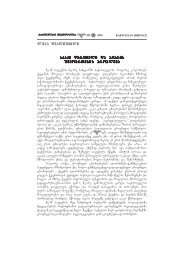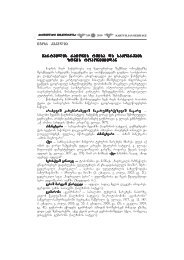- Page 1 and 2:
tariel futkaraZe eka dadiani revaz
- Page 3 and 4:
ganaTlebis erovnuli instituti Natio
- Page 5 and 6:
In April 1999 Georgia became a memb
- Page 7 and 8:
The book is published by the sponso
- Page 9 and 10:
1.2.2. brunvaTa sistema ...........
- Page 11 and 12:
Recommendations and the Law on Migr
- Page 13 and 14:
Preface More than a century Russian
- Page 15 and 16:
dutu megreli (1867-1938): ქარ
- Page 17 and 18:
evrosabWos saparlamento asambleis 1
- Page 19 and 20:
debulebebis araswori, saqarTvelosTv
- Page 21 and 22:
samwuxarod, ukve evrokavSiris eqspe
- Page 23 and 24:
enobrivi istoriisa Tu awmyos Sesaxe
- Page 25 and 26:
svanuri; 11. osuri 21 . Sdr., aseve
- Page 27 and 28:
damtkicebas cdiloben ruseTis imperi
- Page 29 and 30:
saqarTvelos enobrivi situaciis sxva
- Page 31 and 32:
qarTvelTa istoria sam ZiriTad monak
- Page 33 and 34:
zaxefi... xe moWarili ren: naCalnik
- Page 35 and 36:
adgilobrivi renegatis (Tada aSordia
- Page 37 and 38:
amgvari enobrivi politikis dagegmva
- Page 39 and 40:
Tis gadarCenis gegma, romelic sxvad
- Page 41 and 42:
moifiqrebda, Tu am gonivruls wess,
- Page 43 and 44:
ogorc qarTveli eris ganuyrel, organ
- Page 45 and 46:
lobriv sasuliero uwyebas Soris am n
- Page 47 and 48:
saqarTvelosa da qarTvelis eris namd
- Page 49 and 50:
2008 wlebis ruseT-saqarTvelos omiT
- Page 51 and 52:
gv. 6-7): "qarTuli ena, rogorc qarT
- Page 53 and 54:
umwerlobo dedaenaa, xolo qarTuli -
- Page 55 and 56:
metyvelebis) gamijvna; SeiZleba dab
- Page 57 and 58:
1.1.2. qarTvelur ena-kiloTa istorii
- Page 59 and 60:
1.1.3. Tanamedrove qarTveluri qvesi
- Page 61 and 62:
madidebelma eklesiam wmindanad Sera
- Page 63 and 64:
lis salaroSi arc erTs Zmazed Sen na
- Page 65 and 66:
qvejgufad warmovadgenT: centraluri
- Page 67 and 68:
neitraluri H bgera met-naklebad yve
- Page 69 and 70:
(Turq.) "batoni", oFridi (berZn.) "
- Page 71 and 72:
o labializaciaa, Sesabamisad, artik
- Page 73 and 74:
g) SiSina Tanxmovani ucvlelia, ar g
- Page 75 and 76:
qarTvelur qvesistemebSi fonetikur c
- Page 77 and 78:
megrulSi v- prefiqsi i xmovanprefiq
- Page 79 and 80:
3. vi (Ei)>u SedarebiT iSviaTia: mS
- Page 81 and 82:
moTxrobiTi brunva saliteraturo qarT
- Page 83 and 84:
(mTiul.). am SemTxvevaSi -~s, -~h,
- Page 85 and 86:
yamda ori vaJiSvili, umfrosi rva wl
- Page 87 and 88:
megrulis daniSnulebiTis forma zusti
- Page 89 and 90:
I seriis mwkrivTa warmoebis princip
- Page 91 and 92:
v/p-tibu-q “”vTbebi” v/p-tibu
- Page 93 and 94:
zanurSic gardamaval zmnebs I-II pir
- Page 95 and 96:
svanur kiloebSi I kavSirebiTis mawa
- Page 97 and 98:
guaT-e `gavaTave", do-v/p-kil-e `da
- Page 99 and 100:
svanur kiloebSic II kavSirebiTis ni
- Page 101 and 102:
wewavs, Wedavs, xexavs, xocavs... a
- Page 103 and 104:
TurmeobiTsa da III kavSirebiTSi gam
- Page 105 and 106:
Wanuris nimuSebi: miTqvafutu ”meT
- Page 107 and 108:
(do)g-i-xant-u-d-a-s `gexatos" (do)
- Page 109 and 110:
prefiqsiani yalibis identuria rogor
- Page 111 and 112:
gaziarebis SemTxvevaSi Zneli asaxsn
- Page 113 and 114:
iS, B@ni(S) muWES, B@ni(S) muW-d (a
- Page 115 and 116:
umTavres nawils qmnis saerToqarTvel
- Page 117 and 118:
sistemuri msgavseba-gansxvaveba ar
- Page 119 and 120:
ogorc eTnosis istoriuli kulturis in
- Page 121 and 122:
warmodgenili qarTuli Targmanebisa d
- Page 123 and 124:
official language (ganmartebiTi mox
- Page 125 and 126:
gavrcelebuli enebi") daiwunes da up
- Page 127 and 128:
gamoyenebasa da ganviTarebas... mis
- Page 129 and 130:
aqve warmovadgenT mocemul saxelmwif
- Page 131 and 132:
Seuwyon da waaxalison I-dan da III-
- Page 133 and 134:
Sesaxeb perioduli moxsenebebis Sedg
- Page 135 and 136:
umciresobebis uflebebsa da im pirTa
- Page 137 and 138:
2.2. "erovnul umciresobaTa Sesaxeb
- Page 139 and 140:
enaze swavlis an am enaze instruqta
- Page 141 and 142:
cxovrebaSi ganurCevlad maTi erovnul
- Page 143 and 144:
omlebmac ZiriTadad ar ician qarTuli
- Page 145 and 146:
aWaruli, guruli, imeruli, leCxumuri
- Page 147 and 148:
mesxuri variantebi ki warmoqmnilia
- Page 149 and 150:
uSualo mizania qarTveluri (megrul-l
- Page 151 and 152: om igi ar moicavs migrantTa enebs"
- Page 153 and 154: cnobilia, rom saqarTvelos erT-erT i
- Page 155 and 156: Sdr., t. vixerkeviCis jgufis rekome
- Page 157 and 158: statusis sakiTxi dRemde diskusiis T
- Page 159 and 160: ganaCines: dauSvebelia istoriis gay
- Page 161 and 162: qarTuli enobriv-eTnikuri erToba, Se
- Page 163 and 164: standartuli (normalizebuli) da ar g
- Page 165 and 166: leqsika, wes-Cveulebebi, eTnografiu
- Page 167 and 168: Sdr.: t. vixerkeviCis jgufis dausab
- Page 169 and 170: kanonmdeblobiT; mag., ix.: saqarTve
- Page 171 and 172: konkretulad romeli enebi unda CaiTv
- Page 173 and 174: warmoadgens diasporas da romeli und
- Page 175 and 176: saqarTvelos moqalaqe 4 371 535 100.
- Page 177 and 178: t.vixerkeviCis jgufis dausabuTebeli
- Page 179 and 180: kargi iqneboda, am rekomendaciis av
- Page 181 and 182: amisa, "regionuli an umciresobis en
- Page 183 and 184: konstantine gamsaxurdia: "XX saukun
- Page 185 and 186: T. gamyreliZe, "oqros sawmisi" da Z
- Page 187 and 188: dentTa samecniero Sromebis krebuli,
- Page 189 and 190: S. niJaraZe, zemoaWarulis Tavisebur
- Page 191 and 192: t. futkaraZe, evropuli qartia regio
- Page 193 and 194: arn. Ciqobava, iberiul-kavkasiur en
- Page 195 and 196: TinaTin SaraZeniZe ("enaTa klasifik
- Page 197 and 198: Tariel Putkaradze Eka Dadiani Revaz
- Page 199 and 200: tion of National Minorities". Is it
- Page 201: language (national language) 234 .
- Page 205 and 206: authors, Armenian and Azeri languag
- Page 207 and 208: Jonathan Wheatley is well aware tha
- Page 209 and 210: In order to clarify the meaning of
- Page 211 and 212: - 1801-1990 years: period of Russia
- Page 213 and 214: In terms of ideology, a secret lett
- Page 215 and 216: They implanted in the minds of the
- Page 217 and 218: During the 6-year period (1929-1934
- Page 219 and 220: pert and P. J. Hillery who are supp
- Page 221 and 222: perceive, to open their eyes and ma
- Page 223 and 224: Samegrelo. They took advantage of t
- Page 225 and 226: _ What language would you prefer as
- Page 227 and 228: war the neighbouring empire impleme
- Page 229 and 230: national language (ethnic language,
- Page 231 and 232: status of a language or a dialect.
- Page 233 and 234: Zhirmunsky, E. Coseriu), I. Clopeck
- Page 235 and 236: Arn. Chikobava: Zan-Svan 234 Svan Z
- Page 237 and 238: Pkhovian, Kartlian or Imerkhevian e
- Page 239 and 240: districts and almost any villages o
- Page 241 and 242: and semantic structures of the give
- Page 243 and 244: positional (reduced) variant of a v
- Page 245 and 246: (Aliabatian) f, usually occurs in c
- Page 247 and 248: out the a >o process; a > o is labi
- Page 249 and 250: c) a hushing consonant remains unch
- Page 251 and 252: Ghlonti, 1936; V. Topuria, 1954; M.
- Page 253 and 254:
le (Ts. Janjghava, 1989, p. 44). Fo
- Page 255 and 256:
1.2.2. Declension System Declension
- Page 257 and 258:
for both the Svan -em/n marker and
- Page 259 and 260:
zoblep-Ø duriges, ķardlep-Ø mwa
- Page 261 and 262:
Cf.: Old Georgian: ċqaro -yt/ċqar
- Page 263 and 264:
The forms with i-za ending appear i
- Page 265 and 266:
1. dialects, which are characterize
- Page 267 and 268:
Opinions regarding origin and funct
- Page 269 and 270:
Chan p’-ĉar-um-ţ-i "I was writi
- Page 271 and 272:
mār-a-d-e-s, Lashkh: a-mār-d-e-s
- Page 273 and 274:
As a result of unification one mark
- Page 275 and 276:
) suffix -e is present in verbs wit
- Page 277 and 278:
has found out", ausħam(i-s) "he ha
- Page 279 and 280:
In Old Georgian only the auxiliary
- Page 281 and 282:
Apart from synthetic formation of b
- Page 283 and 284:
In Megrelian a group of unipersonal
- Page 285 and 286:
The template for a screeve consider
- Page 287 and 288:
with the attributive modifier in ca
- Page 289 and 290:
Similar facts are rarely attested i
- Page 291 and 292:
other dialects. Therefore, Megrelia
- Page 293 and 294:
Tinatin Sharadzenidze ("Language Cl
- Page 295 and 296:
"The concept of language as used in
- Page 297 and 298:
language of a national minority 329
- Page 299 and 300:
historical language - (31) 340 ; cf
- Page 301 and 302:
3. a language of a non-historical m
- Page 303 and 304:
al or minority languages of Europe,
- Page 305 and 306:
a) i to make available pre-school e
- Page 307 and 308:
) to foster the different means of
- Page 309 and 310:
epresenting a minority in the state
- Page 311 and 312:
Some experts consider even the Arme
- Page 313 and 314:
man Rights and Fundamental Freedoms
- Page 315 and 316:
In this case, bilingual education (
- Page 317 and 318:
the Soviet scientific influence, so
- Page 319 and 320:
cluded in school textbooks as a too
- Page 321 and 322:
2.3.2. The Issue of Languages of Hi
- Page 323 and 324:
It is well known that the Armenian
- Page 325 and 326:
problems though only approximately
- Page 327 and 328:
In our opinion, outdated and incons
- Page 329 and 330:
common Greek language that was tota
- Page 331 and 332:
Naturally, the term "unwritten Geor
- Page 333 and 334:
logava G. Gasviani, R. Khvistani, L
- Page 335 and 336:
There is not historical autochthono
- Page 337 and 338:
The linguistic rights of ethnic min
- Page 339 and 340:
Specifically which languages are to
- Page 341 and 342:
The problem is complicated by the f
- Page 343 and 344:
One important question:like in Geor
- Page 345 and 346:
tection for historical minorities -
- Page 347 and 348:
the borders of Turkey, the very pro
- Page 349 and 350:
megrulis, lazuris, svanuris, taouri
- Page 351 and 352:
T. Gamkrelidze, Z. Kiknadze, I. Sha
- Page 353 and 354:
O. Kakhadze, Specificity of Okribi
- Page 355 and 356:
A. Oniani, Again on Kartvelian lang
- Page 357 and 358:
Sh. Putkaradze, Peculiarities of So
- Page 359 and 360:
Sh. Dzidziguri, Descriptive analysi
- Page 361 and 362:
Konstantine Gamsakhurdia: "The lite
- Page 363 and 364:
Paragraph 32 of the Explanatory Rep
- Page 365 and 366:
ozeta gujejiani, beJan xorava qarTu
- Page 367 and 368:
xelaia, petre Waraia...). msgavsi m
- Page 369 and 370:
is swored svanursa da megrul/lazurS
- Page 371 and 372:
Roseta Gujejiani, Bezhan Khorava Fr
- Page 373 and 374:
In 1941, in the most difficult peri
- Page 375 and 376:
cited as inhabiting Georgia include
- Page 377 and 378:
Tariel Putkaradze Tariel Putkaradze
- Page 379 and 380:
gamoqveynebuli aqvs enaTmecnieruli
- Page 381 and 382:
Revaz Sherozia In 1975 he graduated
- Page 383 and 384:
qarTuli aso-niSnebis saerTaSoriso (
- Page 385:
q q q k k q k q° k° k° R R R ğ




